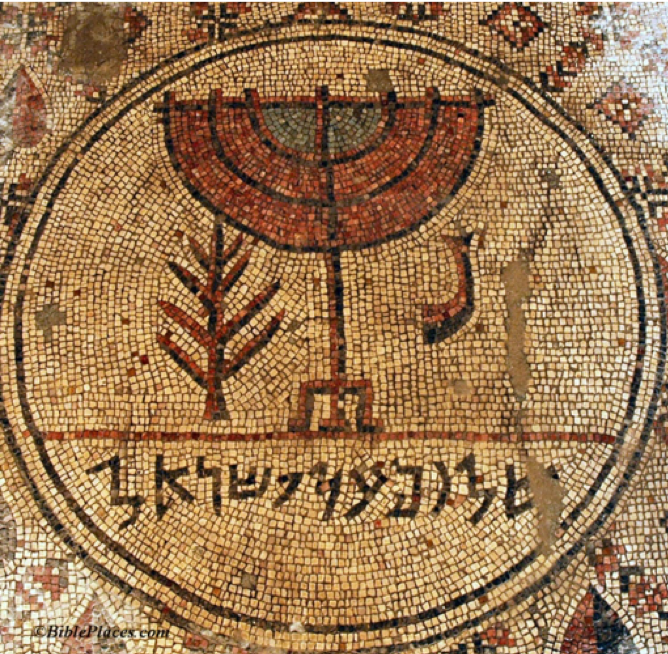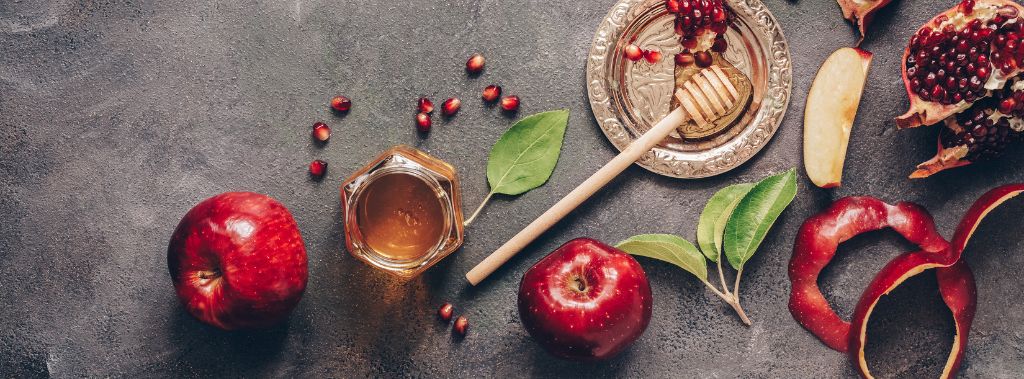Rosh Hashanah | Trumpets Sounding – Part 2
In this second part of the two-part blog series entitled Rosh Hashanah: Trumpets Sounding, we will look at artifacts related not only to Rosh Hashanah, but also to the Jewish and Gentile faith of today. We will see how the Word of God comes to life, and how the Jew and Gentile walk with God and work together to create a beautiful mosaic of faith…
Artifacts of Rosh Hashanah | The Shofar

As we saw in part one, Rosh Hashanah has many symbols that help us capture the essence of the holiday—apples, honey, and shofars being some of the most common. Of these, the shofar has perhaps the deepest meaning and is the most widely depicted in the archaeological record… not only in relation to Rosh Hashanah, but to weekly commandments, such as the Sabbath.
The Sabbath, like Rosh Hashanah, has a direct connection to God, and as a result, the shofar is often used to proclaim the holiness of certain days. It is this connection with God that puts the shofar near the forefront of Jewish symbolism and is why it’s one of the more commonly found symbols on coins, mosaics, etc. in and around Israel—with synagogues and even the Temple often displaying the shofar alongside a menorah.
One of the many reasons for the use of the shofar is the shedding of innocent blood. Abraham, when told to give his son Isaac as a sacrifice to God, went up the mountain to fulfill God’s request. Yet, when God saw the willingness in Abraham’s heart to please Him, He sent a ram to be used as sacrifice. The ram was innocent, as was Isaac, and took the place of Abraham’s son—in this same way innocent blood would differentiate and protect the children of Israel in Egypt from the final plague, and Jesus’ blood would cleanse our sins.
Innocent blood removes, restores, and cleanses… and the sound that emanates from the horn of such an innocent creature cleanses the air, removes the past, and restores what God made to a pre-Garden state. It is the sound of God’s creation.

Apples and Honey
Apples and honey are two of the most common, modern, symbols of Rosh Hashanah, and unlike the shofar, they are not often visually depicted in the archaeological record. Yet, the meaning behind these two foods has ancient, as well as modern, symbolic uses.
Today, in Jewish culture, apples and honey are often eaten together on Rosh Hashanah as they symbolize the desire for a sweet year.
This desire for a sweet year is not limited to oneself or family, but extends to all and is found even in common greetings which translate to a desire for the recipient to ‘have a good year’ and ‘be inscribed and sealed for a good year.’
Still, in the Word, apples and honey have other unique meanings…
“Keep me as the apple of Your eye; hide me under the shadow of Your wings…”
—Psalm 17:8
Commonly, the apple is referenced as something good, desired, or special, but it also references us, and Israel, as being the apple of God’s eye (Deuteronomy 32:10; Psalm 17:8; Zechariah 2:8.) Yet, we also find that in Song of Solomon, apples, while continuing to reference good, desired, or special things, also symbolize something refreshing and sweet.
“Sustain me with cakes of raisins, refresh me with apples, for I am lovesick.”
—Song of Solomon 2:5
Honey, likewise, is used many times in the Word, and like apples, it can simply reference something good, sweet, and desired, but it also has other meanings…
Honey can reference the land of Israel—the land God promised to His children—‘a land flowing with milk and honey.’
“So I have come down to deliver them out of the hand of the Egyptians, and to bring them up from that land to a good and large land, to a land flowing with milk and honey…”
—Exodus 3:8
Even Jacob, then known as Israel, upon sending his sons to the land of Egypt to seek out grain a second time, told them to bring the man in authority good things to satisfy him—including honey. The Sweet honey is meant to satisfy, enchant, and calm.
“And their father Israel said to them, ‘If it must be so, then do this: Take some of the best fruits of the land in your vessels and carry down a present for the man—a little balm and a little honey, spices and myrrh, pistachio nuts and almonds.’”
—Genesis 43:11
In fact, even the Lord’s words are connected to honey—being even sweeter than honey. This ties to the fact that the Torah, God’s words, and His laws, are symbols related to Rosh Hashanah and the desire for a sweet year. For God’s Word is sweet!
“How sweet are Your words to my taste, sweeter than honey to my mouth!”
—Psalm 119:103
Rosh Hashanah and the Church
As we have seen through the Word of God and artifacts, Rosh Hashanah has deep symbolism and importance to the Jewish people… but how does it relate to Gentile Believers?
When we, the Gentiles, listen and follow ALL of God’s Word—from the giving of firstfruits to observing the Sabbath—we receive many blessings. Prosperity, comfort, covenant… the gifts God promised to the children of Israel being ours as well as theirs if we follow His commands.
God never said in His Word that the Gentiles replaced the covenant with the Jews, instead He said that we are grafted in—a people brought to the fullness of God by the sacrifice and love of Jesus, and the faith we’ve received through Him.
“I say then, has God cast away His people? Certainly not! For I also am an Israelite, of the seed of Abraham, of the tribe of Benjamin. God has not cast away His people whom He foreknew…”
—Romans 11:1-2
“For if you were cut out of the olive tree which is wild by nature, and were grafted contrary to nature into a cultivated olive tree, how much more will these, who are natural branches, be grafted into their own olive tree?”
—Romans 11:24
God never said that the Gentiles did not have to read, listen, or obey Old Testament teachings—only that the religious additions of man were not required… and that Jesus’ life, death, and resurrection allowed us to enter into covenant with Him.
As Jesus spoke in Matthew 5:17, “Do not think that I came to destroy the Law or the Prophets. I did not come to destroy but to fulfill.”
The Takeaway
In 325 A.D., during the councils of Elvira and Nicaea, church leaders established many rules and regulations to separate the Church from her Jewish roots of the faith. Subsequently, many tried to erase the memory of the connection between a Jewish Jesus and Christianity. These decisions were not God’s will for Israel or the Church—they simply separated us from the blessings of our heritage.
“But this is what I commanded them, saying, ‘Obey My voice, and I will be your God, and you shall be My people. And walk in all the ways that I have commanded you, that it may be well with you.’”
—Jeremiah 7:23
On this Rosh Hashanah, let the Church arise and take Her place beside Her Jewish brothers and sisters. Let us come together as One New Man in Messiah and find the blessings, prosperity, and covenants that God always desired for us. Let us allow the trumpet of this Rosh Hashanah sound in our hearts as we ask that this year be sweet!
